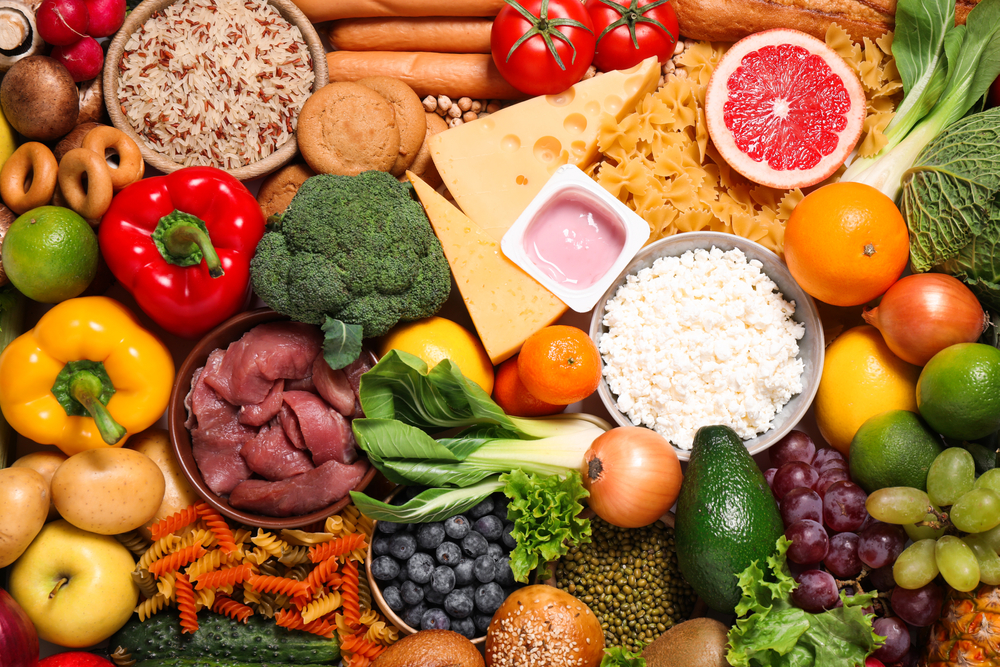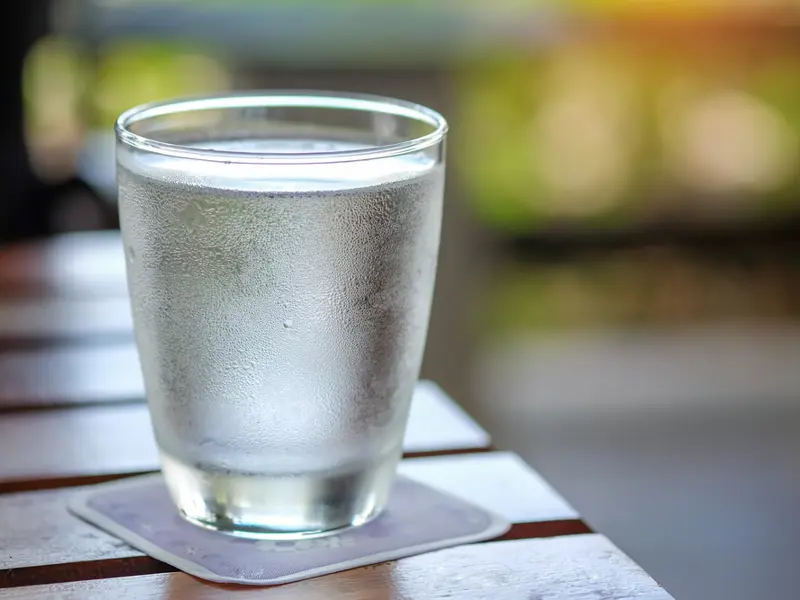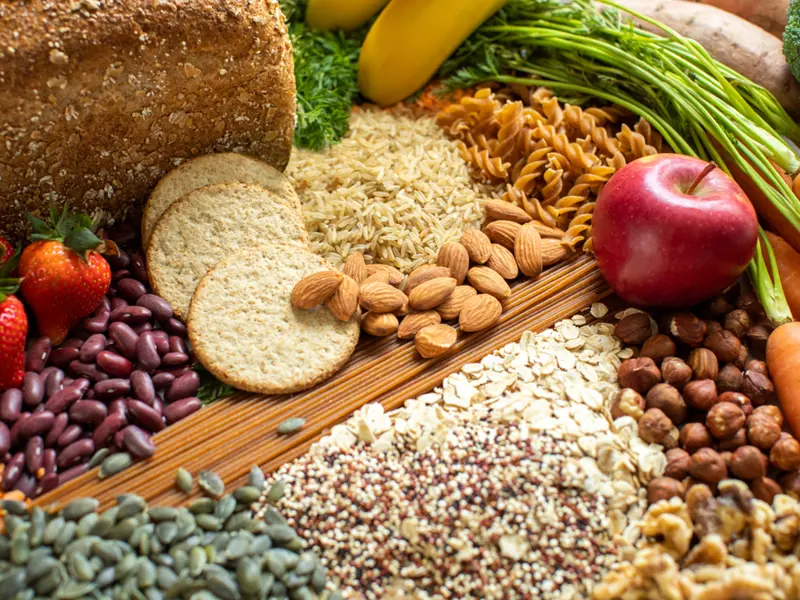The importance of vitamins and minerals
Vitamins and minerals are classified as micronutrients, because they are normally required only in small amounts by the body (typically milligram [mg] or microgram [μg] amounts).
Most vitamins cannot be synthesised by the body and so must be obtained by the diet. However, vitamin D can be synthesised by the action of sunlight on the skin.
Vitamins and minerals are essential for a variety of physiological processes and functions, including:
- Essential constituents of body tissues (such as calcium in bone) and fluids (such as sodium, calcium and potassium)
- Components of enzymes (such as zinc) or enzyme co-factors (such as vitamin B12) involved in a diverse range of processes
- antioxidants that prevent damage from free radicals (such as vitamins E and C)
- Pro-hormone (only vitamin D)
What are the different types of vitamins and minerals?
Vitamins are usually grouped into two categories:
- Water-soluble vitamins: These are not stored in the body and so they must be provided regularly by the diet. Examples include vitamin C and the B vitamins.
- Fat-soluble vitamins: These can be stored by the body in the liver and fat tissues. Examples include vitamins E and D.
Dietary requirements of vitamins and minerals
In the UK, we have a set of dietary reference values (DRVs) for vitamins and minerals, which provide estimates of the physiological requirements for different groups of healthy people within the population. However, these are not intended to be recommendations or goals for individuals.
There are four types of DRV in the UK:
- Estimated Average Requirements (EARs): The EAR is an estimate of the average requirement of a nutrient needed by a group of people, that is approximately 50% of people will require less, and 50% will require more.
- Reference nutrient intakes (RNIs): The RNI is the amount of a nutrient that is enough to ensure that the needs of nearly all a group (97.5%) are being met
- Lower reference nutrient intakes (LRNIs): The LRNI is the amount of a nutrient that is enough for only a small number of people in a group (2.5%) who have low requirements, that is, the majority need more.
- Safe Intake: The Safe Intake is used where there is insufficient evidence to set an EAR, RNI or LRNI. The Safe Intake is the amount judged to be enough for almost everyone, but below a level that could have undesirable effects.
Most DRVs for vitamins and minerals are given as the RNI, except for the vitamin D intake of children under 5 years, for whom a Safe Intake is recommended. For energy, the EAR is used.
Data on the proportion of individuals in the UK from each age group that are not achieving the LRNI is provided by the National Diet and Nutrition Survey (NDNS). The NDNS is a continuous cross-sectional survey, which provides nationally representative data on the food consumption, nutrient intake and nutritional status of the general population aged 1.5 years and over. This provides an indication of micronutrients of concern, for which there is evidence of inadequate intakes. For example, if 10% of a population group have intakes of a nutrient below the LRNI, it is highly likely that most of these people are having insufficient amounts for their needs.
Survey data from NDNS indicates that average intakes of several vitamins and minerals are low among some groups in the UK population (see Table 1), especially among adolescent girls aged 11-18 years.
However, there is uncertainty around the clinical relevance of low intakes of some micronutrients (such as magnesium, potassium, selenium), as their respective DRVs were set in 1991, and were based on limited scientific data.
Table 1. Percentage (%) of population with intakes below the lower reference nutrient intake (LRNI)
| Micronutrient |
4-10 Boys
|
4-10 Girls
|
11-18 Boys
|
11-18 Girls
|
19-64 Men
|
19-64 Women
|
65+ Men
|
65+ Women
|
|
Iron
|
1
|
2
|
11
|
49
|
2
|
25
|
1
|
5
|
|
Zinc
|
8
|
15
|
20
|
16
|
6
|
7
|
9
|
4
|
|
Magnesium
|
1
|
3
|
33
|
47
|
12
|
11
|
14
|
11
|
|
Potassium
|
0
|
1
|
22
|
37
|
10
|
24
|
8
|
20
|
|
Selenium
|
1
|
2
|
24
|
41
|
26
|
46
|
34
|
59
|
|
Iodine
|
6
|
8
|
19
|
28
|
8
|
12
|
4
|
7
|
Note: The LRNI is the amount that is considered sufficient for only 2.5% of the population with the lowest physiological requirements. Source: National Diet and Nutrition Survey Years 9 to 11 (2016/17 to 2018/19).
There is also evidence of inadequate status or deficiency for some essential micronutrients, including iron and vitamin D (Table 2). For example, 9% of girls aged 11-18 years meet the criteria for iron deficiency and anaemia.
Table 2. Percentage of UK population with low status for some micronutrients
| Micronutrient |
Vitamin D
|
Iron
|
Folate
|
|
Children 4-10 years
|
2
|
0
|
7
|
|
Boys aged 4-10 years
|
1
|
0
|
4
|
|
Girls aged 4-10 years
|
3
|
0
|
[9]
|
|
Children 11-18 years
|
19
|
5
|
17
|
|
Boys aged 11-18 years
|
21
|
1
|
16
|
|
Girls aged 11-18 years
|
17
|
9
|
18
|
|
Adults 19-64 years
|
16
|
3
|
13
|
|
Men aged 11-18 years
|
18
|
0
|
10
|
|
Women aged 11-18 years
|
15
|
5
|
15
|
|
Women of childbearing age
(16-49 years)
|
NA
|
NA
|
89
|
|
Adults 65+ years
|
13
|
1
|
11
|
|
Men aged 65+ years
|
13
|
0
|
9
|
|
Women aged 65+ years
|
13
|
2
|
13
|
Vitamin D- mean 25-hydroxyvitamin D status below 25 nmol/L indicating increased risk of deficiency; Iron - haemoglobin and plasma ferritin concentrations below the World Health Organization (WHO) age/sex dependent thresholds for iron deficiency and anaemia; Folate - percentage with red blood cell folate concentrations below the clinical threshold for deficiency (305 nmol/L), or the threshold for increased risk of neural tube defects for women of childbearing age (748 nmol/L); figures in square brackets indicate a sample size less than 50.
High intakes of some micronutrients over time may lead to the risk of toxicity. Maximum recommended safe limits have been published for both the UK (safe upper levels) and the EU (tolerable upper intake levels) to provide guidance on the maximum level of long-term intake of vitamins and minerals that is unlikely to pose a risk of adverse health outcomes.
Deficiencies:
Clinical deficiencies can result in mild to life-threatening symptoms. Some examples of micronutrient deficiencies include
- Scurvy: Severe vitamin C deficiency, with symptoms including swollen, bleeding gums (teeth can fall out), severe joint or leg pain and skin that bruises easily.
- Rickets (children) or osteomalacia (adults): A lack of vitamin D and/or calcium that can lead to poor bone growth and development, including weak bones that can become deformed.
- Goitre: A swelling of the thyroid gland in the neck, which may occur due to a lack of iodine in the diet (although there are other potential causes).
While these conditions are rare in the UK, micronutrient deficiencies are widespread globally and represent a significant public health concern. For example, a lack of iron, folate and vitamins B12 and A can lead to anaemia, a condition which affects an estimated 42% of children under 5 years of age and 40% of pregnant women worldwide and can lead to difficulties in ability to work or in educational attainment.
Vitamin A deficiency is considered the leading cause of preventable blindness in children globally and can increase the risk of disease and death from severe infections (such as diarrhoea and measles).
Labelling of vitamins and minerals
The back-of-pack nutrition information provided on food labels sometimes indicates the amount of vitamins and minerals that a product contains as a percentage of the reference intake (RI), as outlined in European law, although it is not mandatory to provide this information. Other than in Northern Ireland, European regulations governing the legal requirements for the labelling of foods continue to apply following the UK’s departure from the EU.
Several health claims relating to specific vitamins and minerals have been authorised for use on products sold in Great Britain (England, Scotland and Wales). Health claims provide information about the relationship between intake of a vitamin, mineral (or other food component) and health. For example, ‘Calcium is needed for the maintenance of normal bones.’ The use of health claims on product labels typically requires that a product provides at least a ‘source of’ a vitamin or mineral (15% of the RI per 100g or 100ml, or 7.5% per 100ml for beverages), although other specific conditions may apply for use to be permitted.
For more information read the FSA's article on packaging and labelling.
Vitamin and mineral supplement recommendations
There are some cases in which supplementation is recommended :
- The UK government recommends that all children aged between 6 months and 5 years should be given a daily supplement containing vitamins A, C and D.
- Adults and children aged 5 years and above should consider taking (or should be given) a daily 10 microgram (µg) vitamin D supplement during the autumn and winter months.
- Babies from birth to 1 year should be given a daily supplement with 8.5 to 10 micrograms (µg) of vitamin D throughout the year (unless they are consuming more than 500ml of infant formula per day), and children aged 1 to 4 years should be given a daily 10 microgram vitamin D supplement all year round.
- The government recommends that people who are not able to go outside often, or who cover their skin while outside, should take a daily 10 microgram (µg) vitamin D supplement all year round.
- People with dark skin, including those from and African, African-Caribbean or South Asian background, should consider take a daily 10 microgram (µg) vitamin D supplement all year round
- It is recommended that women who are pregnant, trying to conceive or could become pregnant, take a 400 microgram (µg) folic acid supplement daily from preconception until 12 weeks of pregnancy. This is to reduce the risk of the baby being born with a neural tube defect.
Aside from these specific instances in which supplementation is recommended, however, eating a balanced and varied diet should provide sufficient amounts of the vitamins, minerals and other nutrients that are needed, as well as important dietary components such as fibre and natural bioactive compounds (such as polyphenols).
It is important to remember that supplements should not be used as a substitute for a healthy diet.
Helena Gibson-Moore, Nutrition Scientist, British Nutrition Foundation
Several reviews and meta-analyses (where data from a number of studies are analysed together) have generally shown there to be no beneficial effects of vitamin and mineral supplements for reducing the risk of chronic diseases (such as cancer and cardiovascular disease). In some cases, the use of high dose supplements (such as beta-carotene) has been shown to have adverse effects on disease risk.
For individuals who are worried that they may not be getting enough vitamins and minerals from their diet (other than those recommended by government), it is a good idea speak to a doctor or another healthcare professional (such as a dietitian or pharmacist), who will be able to advise on whether it is necessary for their specific needs or health status, and any issues to be aware of (including interactions with prescribed medications).
If using vitamin or mineral supplements, it is a good idea to buy from a reputable company, such as a local pharmacy, supermarket or a high street retailer, to ensure that the product meets the UK requirements for safety (see above). It is also important to always read the label and make sure not to exceed the recommended dosage.








